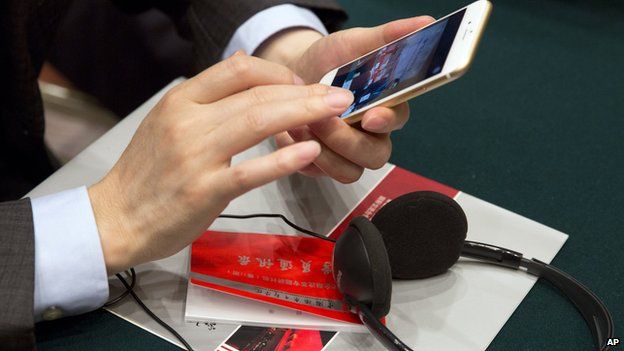China's teenage spin doctors
- Published

A week ago, an unusual job advertisement popped up on a Chinese university website.
Mianyang University is recruiting volunteer internet commentators, the post explained.
The university in southwest China's Sichuan province wanted "patriots who would cheer China's progress" and "rebut online slander about China, using statistics to unpick lies in order to sway the majority".
In short, the university wanted to hire students to work as unpaid internet spin doctors.
It's long been known that China employs legions of people to plant comments on the internet in support of the Chinese government. They're often called "Fifty Centers", since the state pays 50 Chinese cents for each pro-government message posted online.
Typical pro-government commentators write in support of controversial government policies, or major public campaigns, hoping to sway the public.
The Mianyang University advertisement is unusual because it reveals the Communist Party's use of young people to influence what's said on the internet - a programme that's often hidden from view.
CV booster
Across China, large groups of young people are working as government cheerleaders, many of them just teenagers. Most become involved as part of their initial attempts to join the ranks of the Communist Party, a bureaucratic process that often takes years.
A select few join the party because they agree with its ideology, but a large number see membership as a CV booster, a necessity in a tough job market.
For hundreds of thousands of young people, internet commentating is another step on the ladder.
China's eastern Fujian province has 157,553 commentators, according to an email from the Communist Youth League. More than half of them are teenagers, aged 14 to 18, the email explains.
One senior student from a university in China's central Hubei province agreed to explain the practice of hiring internet commentators, or "youth volunteers for internet civilisation", as he calls them.
He didn't want his name used, but he told us that two years ago he built a team of 500 commentators when serving as the head of his school's youth league.
"Most of the students I recruited are class cadres and the applicants for party membership," he explained. "The more politically correct their behaviour, the easier and faster they get promoted. It is kind of compulsory."
At first, the team was built to refute negative rumours about the university. But later, the student says, things changed, and "we started to challenge political rumours instead".
If a news event popped up, team members were asked to comment online. To prove they had done their duty, they would take screenshots of their comments posted online to forward to the university's propaganda department.
The best comments would yield students an "excellent Communist cadre" award. Even better for the young volunteers, they would win several hundred Chinese yuan.
Young and innocent
A second year student from a university in Sichuan told the BBC he was recruited as an internet commentator in 2012.
"Only first-year students are recruited, because they are innocent and easy to deceive,' he explained. Most university entrants in China are around 17 or 18-years-old.
At the interview, "they ask a lot of questions to make sure you are on their side".
"I was asked my opinion on the Diaoyu Island dispute," he remembers, referring to disputed islands in the East China Sea, known as the Diaoyu Islands in China and the Senkaku Islands in Japan.
"I answered that the Diaoyu Islands belong to China. I cannot remember my answer exactly, but I knew they needed a nationalist answer, so I said that.
"Actually, most of the commentators don't have any political stance because they are young and innocent.
"I went for the interview only because I was curious."
The commentators' training manual asked them to make at least three comments opposing negative incidents every day. Nothing is too small for the internet commentators to get involved.
Once, the student remembers, there was a food poisoning incident in the university.
Online, most blamed the incident on contaminated water. The school's Communist Youth League told commentators to tell angry students to "think rationally, look at problems comprehensively, and don't be radical".
"It's funny," the student shrugged. "The Youth League Committee was always telling us not to be radical."
- Published20 October 2012